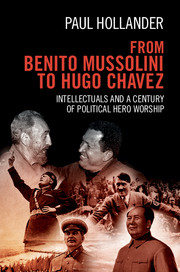Book contents
- Frontmatter
- Contents
- Preface
- 1 Introduction: Intellectuals and Politics
- 2 Mussolini, Fascism, and Intellectuals
- 3 Hitler, Nazism, and Intellectuals
- 4 Stalin, Rakosi, Soviet Communism, and Intellectuals
- 5 Western Intellectuals, Mao's China, and Cambodia under Pol Pot
- 6 Castro, Che Guevara, and Their Western Admirers
- 7 Other Dictators and Their Admirers in More Recent Times
- 8 Conclusions: The Personal and the Political
- Index
8 - Conclusions: The Personal and the Political
Published online by Cambridge University Press: 19 January 2017
- Frontmatter
- Contents
- Preface
- 1 Introduction: Intellectuals and Politics
- 2 Mussolini, Fascism, and Intellectuals
- 3 Hitler, Nazism, and Intellectuals
- 4 Stalin, Rakosi, Soviet Communism, and Intellectuals
- 5 Western Intellectuals, Mao's China, and Cambodia under Pol Pot
- 6 Castro, Che Guevara, and Their Western Admirers
- 7 Other Dictators and Their Admirers in More Recent Times
- 8 Conclusions: The Personal and the Political
- Index
Summary
Men, it appears, would rather believe than know.
Edward O. Wilson[T]he dream of a better world holds out such a compelling attraction that some will become determined to kill everyone who stands in the way of its realization.
Alan Wolfe[W]hen belief in a divinity gives way, a reserve army of idols stands ready to take its place – ideas, dogmas, leaders, movements.
Mark LillaThis book was devoted, for the most part, to attempts to better understand why many Western intellectuals thought well of various contemporary dictators and the political systems they created and dominated. Since in my earlier work (Political Pilgrims) I examined such misjudgments that pertained only to communist states, this time I was interested in finding out if dictatorships of different ideological foundations and histories were also similarly misperceived and idealized. Italian fascism, Nazi Germany, and dictatorships in the Arab world, among others, allowed broader comparisons. It became apparent that there was no shortage of similar misjudgments and illusions inspired by these regimes and their leaders. These findings suggest that the beliefs and dispositions in question have deep roots that transcend the attractions of specific (mostly leftist) ideologies and the political systems that sought to realize them. These sentiments, and the associated misjudgments, originate in a combination of ignorance, idealism, high expectations, wishful thinking, and possibly some other shared personal traits (yet to be identified) of the individuals we call intellectuals.
As to ignorance, Anthony Daniels (whose opinions I respect) disagrees:
one of the myths of the twentieth century is that many Western intellectuals sympathized with the Soviet Union because they were unaware of the true nature of the regime … lack of information allowed … them to fix their mind on the regime's declared ideals … Nothing could be further from the truth … books published in Britain, France and the United States in the 1920s and 1930s … prove that … every class of atrocity, if not every atrocity itself, was made known in the West as soon, or after it occurred.
Doubtless such information was available but not widely disseminated, and those favorably disposed toward the regimes concerned were not anxious to seek it out, and if encountered preferred to question it.
- Type
- Chapter
- Information
- From Benito Mussolini to Hugo ChavezIntellectuals and a Century of Political Hero Worship, pp. 289 - 318Publisher: Cambridge University PressPrint publication year: 2017



